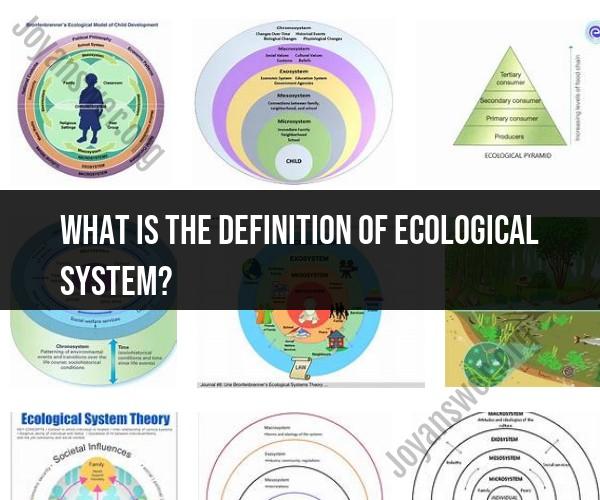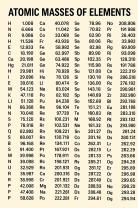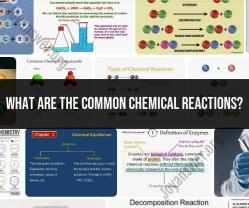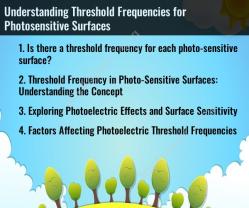What is the definition of ecological system?
An ecological system, also known as an ecosystem, is a complex and dynamic biological community consisting of living organisms (biotic factors) and their physical environment (abiotic factors) within a defined geographical area. Ecological systems are characterized by the interactions and interdependencies among these biotic and abiotic components. They function as integrated units where energy and matter are exchanged and where the activities of living organisms influence the environment and vice versa.
Here's a more comprehensive breakdown of the components and characteristics of an ecological system:
Biotic Components: These include all living organisms within the ecosystem. Biotic components encompass a wide range of species, from plants, animals, and fungi to microorganisms like bacteria. These organisms interact with each other through processes like predation, competition, mutualism, and parasitism.
Abiotic Components: Abiotic factors refer to the non-living elements of the ecosystem. These can include physical factors such as temperature, precipitation, soil composition, sunlight, and topography. Chemical factors like nutrients (e.g., nitrogen, phosphorus) and atmospheric gases (e.g., oxygen, carbon dioxide) also fall under the category of abiotic components.
Interactions: The interactions within ecological systems are multifaceted. Organisms interact with each other for resources such as food, shelter, and mates. They also interact with abiotic factors, as these factors influence the availability of resources and environmental conditions. These interactions lead to the flow of energy and the cycling of nutrients within the system.
Energy Flow: Energy enters an ecological system primarily from the sun (solar energy). Producers, typically plants and algae, capture this energy through photosynthesis, converting it into chemical energy stored in organic molecules. Consumers then obtain energy by consuming these producers or other consumers, creating a food chain or food web.
Nutrient Cycling: Nutrients (e.g., carbon, nitrogen, phosphorus) are essential for the growth and maintenance of living organisms. Decomposers, such as bacteria and fungi, play a critical role in breaking down dead organic matter, returning nutrients to the soil, which can then be taken up by plants.
Adaptations: Organisms within an ecological system often develop specific traits or behaviors adapted to their environment and ecological niche. These adaptations enhance their chances of survival and reproduction within the system.
Succession: Ecological systems can change over time through ecological succession. Primary succession occurs on lifeless surfaces (e.g., bare rock), while secondary succession occurs in areas where an ecosystem has been disturbed (e.g., a forest recovering from a fire).
Resilience and Vulnerability: Some ecosystems display resilience, meaning they can recover from disturbances or environmental changes. Others may be more vulnerable, and even minor disruptions can have significant and lasting impacts on their composition and function.
Human Impact: Human activities, such as deforestation, pollution, habitat destruction, and climate change, can profoundly influence ecological systems. Understanding these impacts is crucial for conservation efforts and sustainable ecosystem management.
In summary, an ecological system is a dynamic and interconnected network of living organisms and their physical surroundings, where processes of energy flow, nutrient cycling, adaptation, and interaction shape the system's structure and function. The study of ecological systems is essential for understanding and preserving the Earth's biodiversity and the balance of life on our planet.
Defining Ecological Systems: A Comprehensive Overview
An ecological system is a community of living organisms and their physical environment interacting as a unified whole. It is a complex and interconnected system in which all the elements play an important role.
Ecological systems can be of all sizes, from a small pond to an entire forest. They can also be simple or complex, depending on the number of different organisms and the interactions between them.
Understanding the Concept of Ecological Systems
The concept of ecological systems is based on the idea that all living organisms are interconnected and interdependent. This means that changes in one part of an ecosystem can have cascading effects on other parts of the system.
For example, if a population of predators in an ecosystem declines, the populations of prey may increase. This can lead to overgrazing of plants, which can damage the ecosystem.
Ecological systems are also influenced by their physical environment. For example, the amount of sunlight, water, and nutrients available in an ecosystem can affect the types of organisms that can live there.
Ecology Unveiled: The Meaning of Ecological Systems
Ecology is the study of ecological systems. Ecologists study the interactions between living organisms and their environment, as well as the factors that influence these interactions.
Ecologists use their knowledge to develop strategies for protecting and managing ecological systems. They also work to educate the public about the importance of ecological systems.
Here are some examples of ecological systems:
- Forests
- Coral reefs
- Grasslands
- Wetlands
- Rivers and lakes
- Oceans
- Cities
- Farms
Ecological systems are essential for life on Earth. They provide us with food, water, air, and other resources that we need to survive. They also play an important role in regulating the climate, protecting biodiversity, and cleaning pollution.
It is important for us to understand the importance of ecological systems and to work to protect them. By doing so, we can ensure that future generations can enjoy the benefits that they provide.












